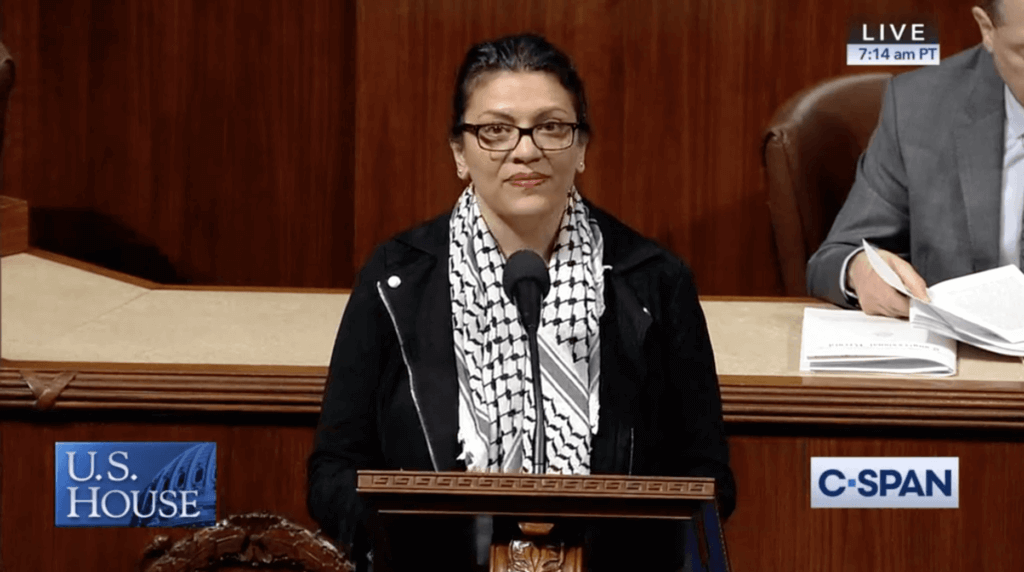The House of Representatives narrowly passed along mostly partisan lines on Friday its most significant piece of legislation on the Israeli-Palestinian impasse this congressional session.
H.Res.326, a non-binding resolution, affirms that “only” a negotiated two-state resolution to the issue “can both ensure the state of Israel’s survival as a Jewish and democratic state and fulfill the legitimate aspirations of the Palestinian people for a state of their own”.
The resolution was adopted 226-188 with two Representatives abstaining.
The much-ballyhooed resolution, enthusiastically trumpeted by J Street, was never more than a reiteration of woefully out-of-date policy prescriptions, but it originally called for an end to Israeli military occupation and settlement activity, and opposed Israel’s annexation of the West Bank. However, the statement was significantly watered down in the House Foreign Affairs Committee by its chair, Rep. Eliot Engel (D-NY), who presided over a process which stripped all reference to opposing occupation and restricted opposition to only the expansion of settlements.
The resolution was further diluted by a last-minute amendment accepted by the Rules Committee, which states that it “is in the enduring United States’ national interest to continue to stand by its ironclad commitments under the 2016 United States-Israel Memorandum of Understanding” to provide Israel with $3.8 billion per year in taxpayer-funded weapons.
Rep. Josh Gottheimer (D-NJ), who sponsored the amendment, which was cosponsored by a bipartisan group of 36 Representatives, stated that its intent is “to ensure no new conditions on US aid to Israel.”
Taking aim at Democratic presidential candidates who have suggested conditioning aid to Israel, Gottheimer argued that “this amendment is absolutely necessary because of the extreme, and misguided views of some, especially several currently running for our nation’s highest office, who seemingly believe that assistance to Israel should be held hostage with new conditions until Israel makes concessions according to their beliefs.”
I just spoke on the House floor in support of my bipartisan amendment to be included in the two-state solution resolution, cosponsored by a bipartisan group of 36 members, to ensure no new conditions on U.S. aid to Israel. (1/4) pic.twitter.com/5OoUQFirLf
— Rep Josh Gottheimer (@RepJoshG) December 6, 2019
In a meager showing of evenhandedness, the Rules Committee also included an amendment offered by Reps. David Price (D-NC) and Mark Pocan (D-WI), which stated that “it is in the United States’ interest to continue promoting the security, stability, and humanitarian well-being of Palestinians and their neighbors by resuming the provision of foreign assistance.”
Within the GOP caucus, only Reps. Bill Posey (R-FL), Tom Reed (R-NY), Francis Rooney (R-FL), Fred Upton (R-MI), and Steve Watkins (R-KS) voted for the resolution.
First-term progressives Reps. Alexandria Ocasio-Cortez (D-NY), Ilhan Omar (D-MN), Ayanna Pressley (D-MA), and Rashida Tlaib (D-MI) were the only Democrats to vote against the resolution, along with Palestinian-American Rep. Justin Amash (I-MI).
Reps. Chuy Garcia (D-IL) and Betty McCollum (D-MN) voted present.
In total, at least 50 Representatives spoke on the floor, issued press statements, and took to social media to express their views on the resolution.
In general, Republicans used the opportunity to back the Trump administration’s emerging plan that would amount to a one-state apartheid reality for perpetual Israeli domination over the Palestinian people. These representatives also used their statements to denigrate Palestinian national rights, advocate for legislation to punish people for boycotting for Palestinian rights, and take pot shots at President Barack Obama for abstaining in 2016 on a UN Security Council reiterating the illegality of Israeli settlements.
Reps. Lee Zeldin (R-NY) and Chip Roy (R-TX) injected a Biblical flavor into their arguments with the former repeatedly referring to the West Bank as “Judea and Samaria” and the latter declaiming: “thank the Lord that [the] United States stands with Israel.”
Democrats primarily rehashed the supposed benefits of a negotiated two-state resolution while refusing to offer any meaningful ideas on how to get there in light of both major Israeli political parties’ opposition to the idea. Most also refused to countenance pressuring Israel in any concrete way to end its military occupation and illegal colonization of Palestinian land, prerequisites for a two-state resolution.
Typical of these statements was the one issued by Rep. Jan Schakowsky (D-IL), who proclaimed herself a “Zionist” and “not naive to the challenges of achieving a negotiated agreement that produces two states for two peoples.”
She then listed those challenges as Hamas’s governance of the Gaza Strip and that the Palestinian Authority continues “to incite and are doing nothing to prepare their population for peace.” Only after establishing her anti-Palestinian bona fides did she mention the actions of the Israeli government and the Trump administration as being detrimental to the establishment of a Palestinian state.
An outstanding and inspiring counterpoint was offered by Tlaib, who spoke on the floor with a kuffiyeh draped around her neck, unconstrained by the pablum of stale two-state discourse.
Tlaib opposed the resolution because it “not only endorses an unrealistic, unattainable solution, one that Israel has made impossible, but also one that legitimizes inequality, ethnic discrimination and inhuman conditions.”
“Separate but equal didn’t work in our country, and I can’t see that it is possible in other countries,” Tlaib continued. “Given our Nation’s history of segregation, we should recognize when such injustices are occurring. We cannot be honest brokers for peace if we refuse to use the words: illegal occupation by Israel.”
I spoke today as the proud granddaughter of a strong, loving Palestinian woman in opposition to #HRes326. We must take bolder actions to ensure human rights are upheld in Israel and that Palestinians and Black Israelis are treated with the equality every human being deserves. pic.twitter.com/G3IlRcoVM6
— Congresswoman Rashida Tlaib (@RepRashida) December 6, 2019
It is also noteworthy that four of the six Democrats who either voted no or abstained–Garcia, McCollum, Omar, and Pressley–were all cosponsors of Rep. Alan Lowenthal’s (D-CA) original version of the resolution. It is rare for cosponsors not to vote for legislation they supported. Their votes were a clear rebuke to the dilution of the resolution.
Significantly, Pocan and Rep. Pramila Jayapal (D-WA), co-chairs of the Congressional Progressive Caucus, who both voted for the resolution, also held open the possibility of conditioning military aid to Israel. In separate statements, Pocan warned that “Congressional assistance could change” if Israel continues to expand its illegal settlements, and Jayapal stated that “my vote does not tie me at all to providing future aid to Israel should it continue to abuse the human rights of the Palestinians. We must maintain leverage over our assistance to ensure American taxpayer dollars are used in ways that are consistent with our values.”
Their statements augur well for the largest caucus in Congress proposing serious conditionality on weapons to Israel in the future.
The vote on H.Res.326 reveals Congress to be more divided than ever in its approach to the Israeli-Palestinian issue. From virtual unanimous opposition to Palestinian statehood during most of the Clinton administration to virtual unanimous support for it during the George W. Bush administration, the bipartisan consensus has irretrievably ruptured.
Almost all Republicans now back Israel’s one-state apartheid rule over the Palestinian people, whereas most Democrats still give lip-service to Palestinian statehood without being willing to pressure Israel toward this end.
However, things are changing for the better within the Democratic caucus as a few Representatives bravely challenge the two-state paradigm and test the waters for conditioning aid to Israel.



The GOP will at some stage betray Israel. This is how power works.
Clearly most members of Congress are betting that Israel will continue meddling in, and indeed dominating American elections for the foreseeable future. They are also betting that the mainstream media will not mention their aiding and abetting Israel’s huge, corrupt foreign influence on American elections. John F. Kennedy wanted to make the chief Zionist organization (AIPAC of that day) register as an agent of a foreign government, which would have eliminated Israeli money from American politics. (Unfortunately, Kennedy was shot.)
Talib identifies the 2SS as an “unrealistic, unattainable solution, one that Israel has made impossible”. Then she says “We cannot be honest brokers for peace if we refuse to use the words” illegal occupation by Israel.”
I find her words confusing. In what way are the words “illegal occupation” important if the goal is one secular state…. her longtime position?
Talib is almost certainly correct saying, “Separate but equal didn’t work in our country, and I can’t see that it is possible in other countries,”
An interesting aspect of her observation is that Jews were the single driving force behind ending inequality in and by America. Likely the most effective way to bring about the political shift in America, in Congress is to shift the narrative to civil rights. Equality under the law is a path to encouraging/empowering humanist Jews to take responsibility for realigning the excesses of Zionism. Could be they are the only ones capable of accomplishing this.
The good news is that “Israel’s” image is in free fall among ever increasing numbers of main street Americans. It’s only a matter of time!